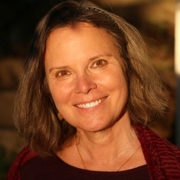Carolyn Forché and the “Poetry of Witness”
By Alexia Paul and Lisa Rubenson
As part of CPCC’s 2019 Sensoria Festival (April 5-12), the public will have two opportunities to hear acclaimed poet and memoirist Carolyn Forché discuss her work and her recent memoir, What You Have Heard is True. Forché is Sensoria’s 2019 Irene Blair Honeycutt Distinguished Lecturer. Both events are free and will take place on CPCC’s main campus, Tuesday, April 9 at 8 pm in Tate Hall and Wednesday, April 10 at 10:30 am in Halton Theatre. 
We’re grateful to Ms. Forché for taking time to answer these questions shared by Charlotte Lit members and Sensoria volunteers, Alexia Paul and Lisa Rubenson.
Q: Why did you choose the written word as your path to storytelling over other means of self-expression?
A: I have always written poetry and stories, since I was nine years old, so there was never a question about my mode of expression.

Q: What role does poetry play in today’s social discourse?
A: Poetry has been called “the natural prayer of the human soul.” It is the oldest of the arts, related to ritual and song, and so it remains a powerful force in the human community, although stronger in some cultures than in others. In today’s social discourse in the United States, poetry is almost invisible, but it is culturally vibrant and ascendant, particularly in those communities who have been silenced or subject to repression. In times of crisis, poets are called upon to speak, even in the United States. This has been especially true in the first two decades of this century.
Q: Please tell us about the first time you discovered the power of words to change people’s understanding of the world around them.
A: My first experience of this would have been in childhood, reading and listening to stories and poems at home and at school, and the discovery of the power of words would have happened again and again. But as I grew up, I perceived that not everyone felt this way. Not everyone understood the power of language. But I have seen its power at work throughout my life. It is not only experience that changes human understanding. It is the articulation of that experience.
Q: Does empathy drive you? Hold you back? Is empathy rooted more in hope or despair?
A: Empathy is a gift, and it is one that can be nurtured and expanded. It is absolutely essential for writers to cultivate the empathetic imagination. This is the portal into the larger world of human experience beyond the self. I don’t think empathy is rooted either in hope or despair. Empathy gives us the capacity to touch others, to move beyond the bounds of ourselves. I would say that the capacity for empathy is the foundation of everything else in our spiritual, artistic, and social lives. There is no art without it. If hope is based on clear awareness, then empathy provides it.
Q: Tell us about your writing practice. When do you know it’s time to shift from experiencing/observing/asking and start writing? Or is there a dividing line at all?
A: I keep notebooks, small notebooks that capture my scribbles, that preserve moments I would otherwise forget. When I write, I must be alone if possible, and for a stretch of time uninterrupted. That is all that writing requires: time, solitude, paper, and pen. The poem begins always with a blank page, in a state of not really knowing anything. One discovers the poem as one writes. For prose, especially prose about a certain subject, place, or time, we must sometimes do research, or otherwise prepare ourselves, but there comes a point when such preparation must be set aside. The writer is again one with the paper.
Q: How was the experience of writing a memoir different from writing poems? Is it a different muscle?
A: For me, the experience was very different. I am a slow writer, and I write many versions of something before I find the right one. That is true of both poetry and prose. But one must hold the whole work in the mind at once. That is a more difficult task with poems, which tend to be shorter, than with long-form prose. One must stay inside the work, live in the world, and this requires a greater commitment of time: days, weeks, months, and years of time. I wrote my prose memoir over a period of fifteen years. In the first phase, I narrowed my subject down to one particular part of my life. In the second, I wrote many hundreds of pages. In the final phase, I found the shape and structure. And I discovered the story that was trying to be told.
After beginning her career at The William Morris Agency, Alexia Paul honed her writing and editorial skills at the Joy Harris Literary Agency in New York, where she sold books to publishers such as Random House and Little Brown. Since the launch of Alexia Paul Editorial here in Charlotte in 2005, she has helped over one hundred clients create or perfect their work. Alexia lives in Plaza Midwood with her husband and two children. Learn more: alexiapaul.com.
